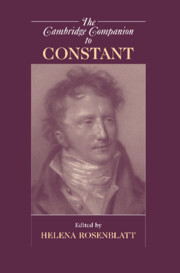Book contents
- Frontmatter
- Introduction
- 1 Benjamin Constant: Life and Work
- Part I The Political Thinker and Actor
- Part II The Psychologist and Critic
- Part III The Analyst and Historian of Religion
- 12 Religion According to Constant
- 13 Constant on the Religious Spirit of Liberalism
- 14 Constant and Religion: “Theism Descends from Heaven to Earth”
- Conclusion
- 15 Eclipses and Revivals Constant’s: Reception in France and America 1830-2007
- Bibliography
- Index
- Series List
14 - Constant and Religion: “Theism Descends from Heaven to Earth”
from Part III - The Analyst and Historian of Religion
Published online by Cambridge University Press: 28 July 2009
- Frontmatter
- Introduction
- 1 Benjamin Constant: Life and Work
- Part I The Political Thinker and Actor
- Part II The Psychologist and Critic
- Part III The Analyst and Historian of Religion
- 12 Religion According to Constant
- 13 Constant on the Religious Spirit of Liberalism
- 14 Constant and Religion: “Theism Descends from Heaven to Earth”
- Conclusion
- 15 Eclipses and Revivals Constant’s: Reception in France and America 1830-2007
- Bibliography
- Index
- Series List
Summary
The aim of this essay is to complicate the standard picture of Constant as a “modern liberal” and as a proponent of what Isaiah Berlin famously called “negative liberty” by showing that from the beginning to the end of his life Constant’s “liberalism” was always informed by religious values - mainly liberal Protestant ones but also ones which, since the late seventeenth century, have been associated with what was then called “philosophic theism.” Theism, as we shall later discuss, is a religious tradition that was just beginning to be discovered and understood as a tradition in the seventeenth and eighteenth centuries. Indeed, entries on theism in dictionaries and encyclopedias of the period are infrequent - which is why A. E. Taylor was right to remind twentieth-century readers of two things: that theism is a “purely modern” word, and that it was just beginning to be used as a neologism in French, German, and English religious discourse in the late seventeenth and eighteenth centuries.
As we shall also see, the word came into vogue through the philosophical writings of Cudworth, Shaftesbury, Diderot, Voltaire, Rousseau, Hume, and above all, Kant. In their writings, it turns out that theism is linked to a conception of God in which providential considerations in a transcendental sense and ethical considerations in an immanent sense are conjoined – thought together in Kant’s terms – to forma theological anthropology that makes moral perfection the purpose of human life.
- Type
- Chapter
- Information
- The Cambridge Companion to Constant , pp. 313 - 348Publisher: Cambridge University PressPrint publication year: 2009
- 1
- Cited by

